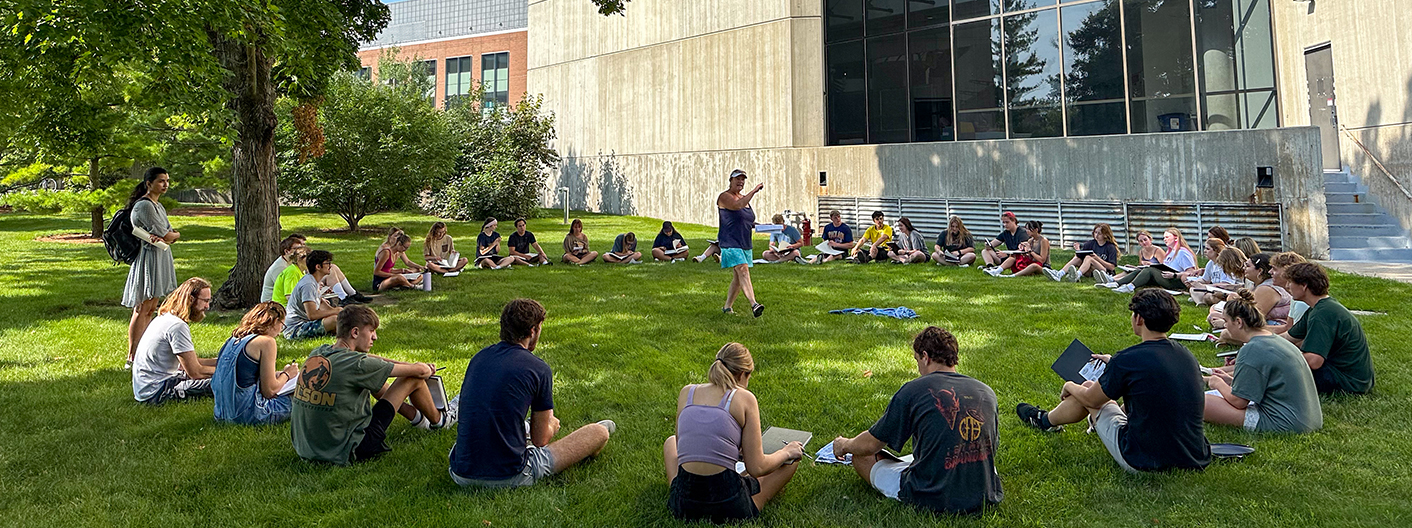The College of Design’s undergraduate minor in Digital Media is intended to familiarize students with the use of digital media in the design process. This minor is open to all undergraduate students at Iowa State University. It covers the knowledge and techniques necessary to generate digital representations for a wide variety of disciplines.
REQUIREMENTS
This minor requires at least 15 credits of coursework.
Students are required to complete three (3) credits of fundamental courses at the 200 level, and then at least nine (9) credits of elective courses at the 300 level or above. At least nine (9) credits must not be used to meet any other college or university requirements except the credit requirement for graduation.
FUNDAMENTAL COURSES (choose 3-6 credits)
College of Design Majors
(courses may be restricted to their respective majors)
ARCH 230: Design Communications (3 credits)
ARCH 231: Advanced Design Representation (3 credits)
ARTGR 272: Digital Photography for Graphic Design (3 credits)
ARTIS 227: Introduction to Creative Digital Photography (3 credits)
ARTID 263: Graphic Communication for Interior Design II (3 credits)
Open to all majors
DSN S 232: Digital Design Communications (3 credits)
ARTIS 212: Studio Fundamentals: Computers (3 credits)
CRP 251: Fundamentals of Geographic Information Systems (3 credits)
LA 211: Digital Design Methods for Landscape Architecture (3 credits)
ELECTIVE COURSES (choose 9-12 credits)
Courses with no prerequisites
ARCH 334: Computer Applications in Architecture (3 credits)
ARCH 432: Advanced Computer Lighting and Rendering (3 credits)
ARCH 434: Computer-aided Architectural and Environmental Design (3 credits)
ARCH 534: Topics in Computer-aided Architectural Design (3 credits)
Courses with prerequisites
ARCH 433: File to Fabrication (3 credits)
ARCH 437: Architectural Photography (3 credits)
ARCH 439/539: Computational Design Theory (3 credits)
ARCH 451x/551x: Whole Building Energy Performance Modeling (3 credits)
ARCH 528A: Equity in Computing (3 credits)
ARTIS 308: Modeling, Rendering and Virtual Photography (3 credits)
ARTIS 407/507: Principles of 3D Character Animation (3 credits)
ARTIS 408/508: Principles of 3D Animation (3 credits)
ARTIS 448/548: Digital Textile Design (3 credits)
ARTIS 473/573: Video Art (3 credits)
ARTIS 475/575: Interactive Art (3 credits)
ARTIS 482: Data Visualization (3 credits)
CRP 351: Intermediate Geographic Information Systems (3 credits)
CRP 452/552: Geographic Data Management and Planning Analysis (3 credits)
CRP454/554: Fundamentals of Remote Sensing (3 credits)
INDD 341: Computer Aided Industrial Design
INDD 541: Computer Aided Industrial Design (3 credits)
LA 457/557: Landscape Parametrics and Design Coding (4 credits)
LA 458/558: Web Mapping/GIS (3 credits)
LA 478G: Topical ST Graphics (2-3 credits)
DSN S 332: Multi-dimensional Digital Design Communication (3 credits)
DSN S 333: Time-Based Digital Media (3 credits)
How to Apply for the Digital Media Minor
If you are interested in registering for the Digital Media minor, contact your academic advisor. They will complete a curriculum change form to add the minor for you.


